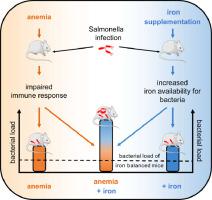EBioMedicine ( IF 9.7 ) Pub Date : 2021-09-03 , DOI: 10.1016/j.ebiom.2021.103568 Alexander Hoffmann 1 , David Haschka 2 , Lara Valente de Souza 1 , Piotr Tymoszuk 2 , Markus Seifert 1 , Laura von Raffay 2 , Richard Hilbe 2 , Verena Petzer 2 , Patrizia L Moser 3 , Manfred Nairz 2 , Günter Weiss 1

|
Background
Iron deficiency anaemia (IDA) is a major health concern. However, preventive iron supplementation in regions with high burden of infectious diseases resulted in an increase of infection related morbidity and mortality.
Methods
We fed male C57BL/6N mice with either an iron deficient or an iron adequate diet. Next, they received oral iron supplementation or placebo followed by intraperitoneal infection with Salmonella Typhimurium (S.Tm).
Findings
We found that mice with IDA had a poorer clinical outcome than mice on an iron adequate diet. Interestingly, iron supplementation of IDA mice resulted in higher bacterial burden in organs and shortened survival. Increased transferrin saturation and non-transferrin bound iron in the circulation together with low expression of ferroportin facilitated the access of the pathogen to iron and promoted bacterial growth. Anaemia, independent of iron supplementation, was correlated with reduced neutrophil counts and cytotoxic T cells. With iron supplementation, anaemia additionally correlated with increased splenic levels of the cytokine IL-10, which is suggestive for a weakened immune control to S.Tm infection.
Interpretation
Supplementing iron to anaemic mice worsens the clinical course of bacterial infection. This can be traced back to increased iron delivery to bacteria along with an impaired anti-microbial immune response. Our findings may have important implications for iron supplementation strategies in areas with high endemic burden of infections, putting those individuals, who potentially profit most from iron supplementation for anaemia, at the highest risk for infections.
Funding
Financial support by the Christian Doppler Laboratory for Iron Metabolism and Anemia Research.
中文翻译:

基线铁状态和贫血的存在决定了小鼠口服铁补充剂后全身沙门氏菌感染的过程
背景
缺铁性贫血(IDA)是一个主要的健康问题。然而,在传染病高负担地区预防性补铁导致感染相关发病率和死亡率增加。
方法
我们用缺铁或铁充足的饮食喂养雄性 C57BL/6N 小鼠。接下来,他们接受口服铁补充剂或安慰剂,然后腹膜内感染鼠伤寒沙门氏菌(S.Tm)。
发现
我们发现患有 IDA 的小鼠的临床结果比铁充足饮食的小鼠差。有趣的是,给 IDA 小鼠补充铁会导致器官中细菌负荷增加并缩短生存期。循环中转铁蛋白饱和度和非转铁蛋白结合铁的增加以及铁转运蛋白的低表达促进了病原体接触铁并促进细菌生长。贫血与铁补充剂无关,与中性粒细胞计数和细胞毒性 T 细胞减少相关。补充铁剂后,贫血还与脾脏细胞因子 IL-10 水平升高相关,这表明对 S.Tm 感染的免疫控制减弱。
解释
给贫血小鼠补充铁会加重细菌感染的临床病程。这可以追溯到向细菌输送铁的增加以及抗微生物免疫反应受损。我们的研究结果可能对感染流行负担高的地区的铁补充剂策略产生重要影响,使那些可能从贫血补铁中获益最多的人感染风险最高。
资金
克里斯蒂安多普勒铁代谢和贫血研究实验室的财政支持。











































 京公网安备 11010802027423号
京公网安备 11010802027423号